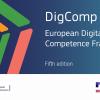The Digital Competence Framework (DigComp)
DigComp provides a common framework to assist European citizens and workforce in self-evaluating their skills, setting learning goals, identifying training opportunities, and reaching more and better career opportunities.
The Digital Competence Framework has inspired more than 20 tools in different EU Member States, across target groups of society. DigComp 2.0 defines key digital competences across 5 areas:
- Information and data literacy (such as the ability to explain information needs; locate, retrieve, store and manage digital data, content and information, or to assess the relevance of the source and the validity of its content).
- Communication and collaboration (the ability to interact, communicate and collaborate with others through the use of digital technologies, taking into account cultural and generational diversity, to manage digital identity and online reputation and take part in society through the use of digital public and private services).
- Digital content creation (the ability to create, edit and improve digital content and abide by licensing and copyright, or to revise and integrate information and provide instructions to a computer system or device).
- Safety (like the ability to ensure that personal and work devices are protected, including personal and work-related data and sensitive information in digital environments, or to understand how technology impacts mental and physical wellbeing and a general awareness of the environmental impact of digital).
- Problem solving (the ability to identify needs and problems and resolve them in different digital environments, the ability to use digital tools to improve processes, services and products, and keep up to date with the evolution of technology).
DigComp 2.2: a revamped framework for digital skills
First launched in 2013 by the European Commission's Joint Research Centre (JRC), DigComp has evolved. In 2022, the framework was updated to its current form, DigComp 2.2, integrated with 250 new examples of knowledge, skills and attitudes that help citizens engage confidently, critically and safely with digital technologies, and new and emerging ones such as systems driven by artificial intelligence (AI).
The DigComp framework is a valuable tool for policymakers, because it can help them verify where citizens stand regarding digital skills at a national level. Therefore, the framework can be effectively used to plan and design training and education offers at European level. An example of the interconnection between this framework and other initiatives at European level is is the Digital Economy and Society Index (DESI), which includes an innovative indicator of Digital Skills that uses DigComp Framework. It is also used extensively on national level, with EU Member States aligning their own national frameworks for education and skills with the digital competence areas of DigComp.





